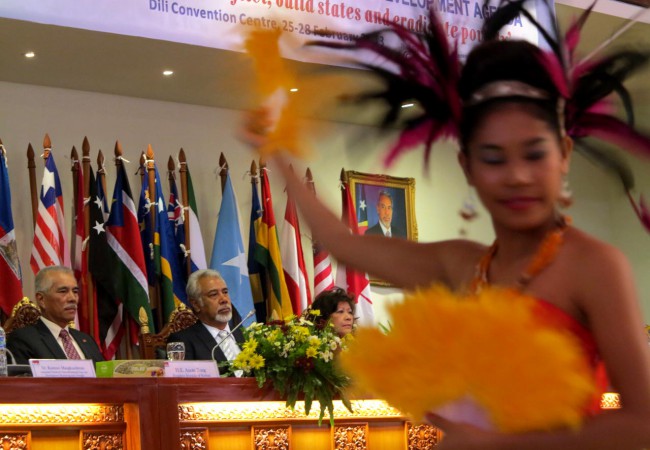
Pacific leaders want a new deal
Pacific leaders meeting in Timor-Leste have echoed the objectives of g7+ nations by asking for a new deal on development that reflects their national development priorities once the Millennium Development Goals (MDGs) expire in 2015.
This follows a roundtable discussion aimed at influencing the UN High Level Panel of Eminent Persons on the Post-2015 Development Agenda. The leaders have released the outcomes of their roundtable discussions in a communiqué.
While they acknowledged the MDGs, they identified five broad areas that were not covered in the MDGs: inclusive growth, environmental and natural resource management, state effectiveness, peace and justice and aspects of social delivery. The focus was on the human dimension of development, “based on our own conceptions of poverty and wellbeing”. Climate change and “owning our own problems to find our own solutions” came up as key issues.
The following sums up some of the key points of the communiqué, calling for a new deal:
- Make development strategies more resulted-oriented and emphasis quality not quantity of outputs
- Shared concerns over application of global goals and one-size-fits-all approach to implementing development aims
- Investing in economic infrastructure including regional integration and global connectivity
- Development efforts must be fully inclusive of women, youth and children, persons with disabilities and the elderly
- Better management of natural environment, especially ocean fisheries and ensure fair and sustainable returns
- Hold to account countries responsible for climate change and marshal international support for climate change mitigation, adaptation and disaster risk reduction strategies
- Addresses issues of state effectiveness
- Addresses peace, stability and rule of law—a perspective articulated by the g7+ group
- Encourages ownership of programs and this means identifying own problems and finding local solutions that are culturally sensitive
- Link national development goals with global development agenda but not subordinate them while customising targets
- No conclusion on time horizon for the post-2015 development agenda was reached but leaders noted the need to provide a realistic opportunity for each country to reach the new goals and to recognise the different stages of development of public institutions
- Recognised major constraints on the availability of data and the capacity to develop policy on the basis of what data is available
- Emphasised the importance of cross-regional, regional and sub-regional solidarity by ensuring Pacific voices heard on the global stage.
Timor-Leste’s Minister of Finance Emilia Pires will present these outcomes to the High Level Panel.
